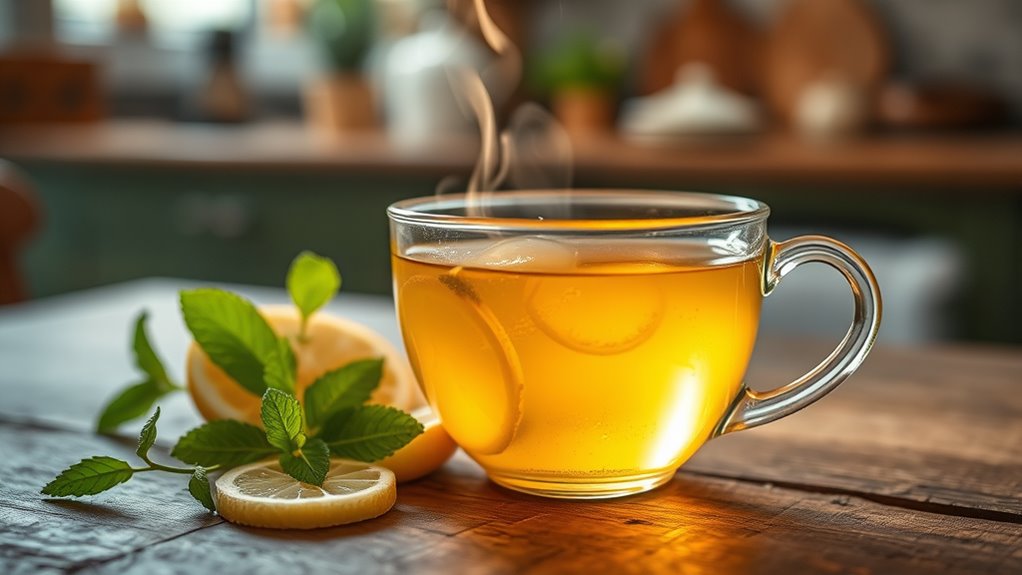Sip This Gut-Healing Tea After Every Meal
You know how important gut health is for overall well-being. Incorporating a gut-healing tea after each meal can make a significant difference. This simple practice nurtures your microbiome and enhances digestion. With key ingredients like ginger, peppermint, chamomile, and turmeric, this tea offers a range of benefits. Want to know how to brew it perfectly and why you should make it a daily ritual? Let’s explore what makes this tea so effective.
Key Takeaways
- Brewing a gut-healing tea after meals enhances digestion and improves nutrient absorption for optimal gut health.
- Key ingredients like ginger and peppermint alleviate bloating and digestive discomfort effectively.
- A calming tea ritual post-meal can promote relaxation and support overall wellness.
- Incorporating adaptogenic herbs in your tea can help manage stress and improve digestive function.
- Establishing a dedicated tea station at home makes it easy to enjoy this gut-supportive beverage daily.
Understanding Gut Health
What does gut health really mean? It refers to the balance and diversity of your microbiome, the complex community of bacteria in your digestive system.
Microbiome diversity is crucial for digestive wellness, impacting everything from nutrient absorption to immune function.
When your gut flora is diverse, it helps prevent digestive discomfort, inflammation, and various health issues.
To support your gut health, focus on a diet rich in fiber, fermented foods, and prebiotics.
By nurturing your microbiome, you can enhance your overall wellness and keep your digestive system functioning optimally. Incorporating homemade probiotic drinks into your routine can further promote a healthy gut environment.
Prioritizing gut health is a vital step towards a healthier you.
Key Ingredients for Gut-Healing Tea
When crafting your gut-healing tea, it’s essential to choose the right herbs that support digestion and overall gut health.
Each ingredient offers unique benefits, from soothing inflammation to promoting healthy gut flora.
Let’s explore some key healing herbs and how they can enhance your tea’s effectiveness. Incorporating ingredients like ginger and peppermint can provide quick relief from bloating and enhance your overall digestive comfort.
Healing Herbs Overview
Healing herbs play a crucial role in creating gut-healing tea, offering a natural approach to support digestive health.
These herbs have ancient uses across cultures and demonstrate global applications in promoting wellness.
Here are four key ingredients you’ll find beneficial:
- Ginger: Known for its anti-inflammatory properties, it aids digestion.
- Peppermint: Traditionally used to relieve bloating and discomfort.
- Chamomile: Offers calming effects, promoting gut relaxation.
- Turmeric: Celebrated for its antioxidant benefits, it supports overall digestive function.
Incorporating these herbs can enhance your tea, helping you achieve optimal gut health naturally.
Benefits of Each Ingredient
Understanding the benefits of each ingredient in your gut-healing tea can enhance its effectiveness.
Ginger adds a spicy kick and aids digestion, while peppermint provides flavor enhancement and soothes the stomach.
Turmeric is known for its anti-inflammatory properties, promoting gut health.
Adding honey not only sweetens but also offers cosmetic benefits, improving skin health.
Lastly, chamomile calms your body and mind, making it perfect after meals.
Together, these ingredients create a powerful blend that supports digestive wellness and enhances your overall well-being.
How to Brew the Perfect Gut-Healing Tea
Have you ever wondered how to brew the perfect gut-healing tea?
Follow these simple steps to ensure you get the most benefits:
- Choose Quality Water: Use filtered or spring water for the best flavor and health benefits.
- Select Brewing Vessels: Opt for glass or ceramic teapots to avoid chemical leaching.
- Measure Ingredients: Use the right ratio of herbs to water, typically one teaspoon of dried herbs per cup.
- Steep Properly: Allow the tea to steep for 5-10 minutes to extract maximum nutrients. Additionally, incorporating adaptogenic herbs into your tea can enhance its health benefits by supporting your body’s stress response and promoting overall wellness.
Benefits of Drinking Tea After Meals
Drinking tea after meals can enhance digestion and provide a range of health benefits.
It aids in breaking down food, making nutrients more accessible for absorption.
This can support weight control, as certain teas help regulate metabolism and reduce cravings.
Additionally, sipping tea post-meal can promote mood enhancement, thanks to compounds like L-theanine that foster relaxation and reduce stress.
By incorporating this simple habit, you not only improve your digestive health but also create a soothing ritual that can elevate your overall well-being. Furthermore, certain herbal tea blends are known for their immune support properties, which can further boost your vitality after meals.
Tips for Incorporating Tea Into Your Routine
By making a few simple adjustments, you can enjoy gut-healing benefits with ease.
Here are some effective routine hacks to optimize your tea timing:
- Post-Meal Ritual: Brew a cup right after meals to enhance digestion and absorption.
- Morning Boost: Swap your morning coffee for a soothing tea to kickstart your day.
- Set Reminders: Use phone alerts to remind you when to brew your tea.
- Tea Station: Create a dedicated tea corner at home to make preparation effortless.
Incorporating tea doesn’t have to be complicated—just enjoy it! Additionally, drinking tea can aid in a simple gut reset by soothing your digestive system and reducing discomfort.
Delicious Recipes for Gut-Healing Tea
Tea can be a delicious way to support gut health, and there are numerous recipes to explore.
Try a ginger-lemon tea, combining fresh ginger and lemon juice for anti-inflammatory benefits. For a soothing blend, steep chamomile with a touch of honey and cinnamon. You can also create themed recipes, like a detox tea with dandelion root and peppermint for a refreshing twist. Additionally, incorporating ginger and lavender tea into your routine may provide quick relief for migraine sufferers, enhancing your overall wellness. Don’t forget presentation ideas—serve your teas in clear glass mugs to showcase their vibrant colors, and add a sprig of fresh mint for an appealing finish.
Enjoy these flavorful options to enhance your gut health after every meal!

